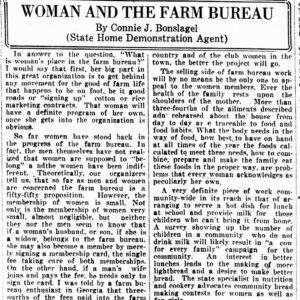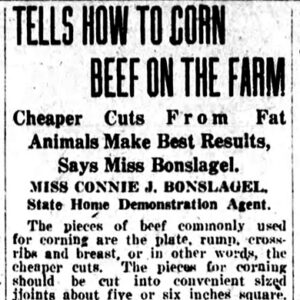calsfoundation@cals.org
Constance Josephine (Connie) Bonslagel (1885–1950)
Constance Josephine (Connie) Bonslagel served as state home demonstration agent from 1917 until her death in 1950, except for an eighteen-month period during the 1930s in which she served as assistant director of the Rehabilitation Division of the Federal Resettlement Administration (FRA). She pioneered the women’s part of that program, setting up home economics programs in most of the states.
Connie J. Bonslagel was born in Deasonville, Mississippi, on August 14, 1885, the daughter of A. W. Bonslagel and Betty Beall Bonslagel. She had one sister and one brother. Bonslagel, who never married, graduated from Mississippi State College for Women and pursued postgraduate work at Peabody College, Tulane University, and Columbia University Teachers College.
Beginning in 1915, Bonslagel served as an assistant to the state home demonstration agent in Mississippi before coming to Arkansas. Her duties were those of a specialist in charge of canning in northern Mississippi. She came to Arkansas during the program’s developmental stage—only three years after the Smith-Lever Act of 1914 was passed by the U.S. Congress to provide federal funding for the Cooperative Extension Service of the U.S. Department of Agriculture. Bonslagel’s service to Arkansas encompassed periods of dramatic change for women. Early on, for example, she encountered rural women who took their newly honed homemaking skills and looked outside their own homes to neighbors in need—just as women in all walks of life were doing throughout the Progressive Era. In addition, she experienced firsthand the difficulties of retaining college-educated female agents because of widespread antagonism toward married women in the workforce.
During the 1930s, she also worked with counties that were unable to fund their share of the home demonstration program, as well as the state legislature, which considered closing down all extension work. Realizing the power of numbers and organization, the rural women wrote letters to county and state officials, urging continuation of the work. Then, as higher education continued to become more accessible for young women, clubs throughout the state raised over $140,000 from 1938 to 1950 to build a sorority-type, cooperative 4-H House for rural young women attending the University of Arkansas (UA) in Fayetteville (Washington County). Because of Bonslagel’s leadership in inspiring the fundraising efforts, the 4-H House’s music room was dedicated to her memory.
Perhaps one of Bonslagel’s most creative contributions was the rural women’s annual encampment at Camp Joseph T. Robinson during the 1930s. The encampment—which was featured in a full article in Good Housekeeping magazine in 1939—provided a few days’ respite and education for 1,200 rural women, who boarded school buses, brought their own plates and utensils, and slept in army tents. Military officers coordinated the encampment’s logistics, and enlisted men set up the tents and cooked the meals.
Bonslagel was a member of the Women’s Committee of the Council of Defense during World War I and the committee on landscape planning and planting for President Herbert Hoover’s Conference on Home Building and Home Ownership during the 1930s. She served as president of the Arkansas Home Economics Association, chairman of the Home Economics Division of the Arkansas Federation of Women’s Clubs, vice president of the Association of Southern Agricultural Workers, and chairman of its home economics section. She was listed in an early edition of Arkansas Who’s Who and was named woman of the year in agriculture in 1940 by the Progressive Farmer, a southern agricultural journal. In addition, she was a member of Epsilon Sigma Phi, an honorary Extension fraternity.
Bonslagel died on May 21, 1950, and is buried in Jackson, Mississippi.
For additional information:
“Connie J. Bonslagel, State Extension Specialist, Dies.” Arkansas Gazette, May 22, 1950, pp. 1, 6.
“Extension Service Leader Dies.” Arkansas Democrat, May 22, 1950, p. 14.
Hill, Elizabeth Griffin. A Splendid Piece of Work—1912–2012: One Hundred Years of Arkansas’s Home Demonstration and Extension Homemakers Clubs. N.p.: 2012.
U.S. Department of Agriculture Cooperative Extension Service. Record Group 33. National Archives and Records Administration at Fort Worth, Fort Worth, Texas.
Elizabeth Griffin Hill
North Little Rock, Arkansas
 Early Twentieth Century, 1901 through 1940
Early Twentieth Century, 1901 through 1940 Connie Bonslagel Editorial
Connie Bonslagel Editorial  Connie Bonslagel Article
Connie Bonslagel Article 




Comments
No comments on this entry yet.